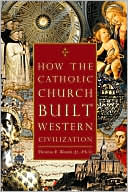A paper over at the Catholic Education Resource Center is a nice summary of arguments against gay marriage. Interestingly one of the writers is gay. Neither is Catholic nor in full agreement with the Church's teaching on the matter which is made clear in the disclaimer on the site. Still, the writers are intelligent enough to recognize the dangers of redefining marriage. H/T to Beetle Blogger.
The summary make some key point in the whole debate. One, that gay relationships are already supported by most of the economic and legal benefits given to common-law couples or could be, which makes me suspicious of the true motive behind redefining marriage as something more akin to an assault on Christians rather than a plea for equality.
Second I think it does a pretty good job of describing the dangerous cultural and societal implications inherent in redefining marriage.
Third it defines the whole thing accurately, I think, as a massive human experiment, one whose consequences if wrong would wreak havoc on our children and our society.
Click on the claim for the rebuttal.
Claim 1: Marriage is an institution designed to foster the love between two people. Gay people can love each other just as straight people can. Ergo, marriage should be open to gay people.
Claim 2: Not all straight couples have children, but no one argues that their marriages are unacceptable
Claim 3: Some gay couples do have children and therefore need marriage to provide the appropriate context.
Claim 4: Marriage and the family are always changing anyway, so why not allow this change?
Claim 5: Marriage and the family have already changed, so why not acknowledge the reality?
Claim 6: Children would be no worse off with happily married gay parents than they are with unhappily married straight ones.
Claim 7: Given global overpopulation, why would anyone worry about some alleged need to have more children in any case?
Claim 8: Marriage should change, whether it already has or not, because patriarchal institutions are evil.
Claim 9: Gay marriage has had historical and anthropological precedents.
Claim 10: Banning gay marriage is like banning interracial marriage.
Claim 11: The case for gay marriage is more "poignant" than the case against it.
Claim 12: Gay marriage is necessary for the self-esteem of a minority.
Claim 13: Anyone who opposes same-sex marriage is homophobic.
Claim 14: Exceptions could be made for religious communities that disapprove of gay marriage, or religious communities could simply add their rites to those of the state.
Claim 15: To sustain an "ethic of caring and responsibility," we must include gay people in every institution.
Claim 16: Norms of any kind at all are discriminatory.
Claim 17: Almost everyone believes in equality. How can we have that if gay citizens are denied the same rights as other citizens?
Claim 18: Winning the struggle for gay marriage is important for the cause of gay liberation.
Claim 19: What about majority rule in democratic countries?
Claim 20: But gay people are a small minority. Allowing them to marry would mean nothing more than a slight alteration to the existing system and would even add support for the institution. What's all the fuss about?
Conclusion Endnotes
Summary
There's nothing wrong with homosexuality. One of us, in fact, is gay. We oppose gay marriage, not gay relationships (which are already supported by most of the economic and legal benefits given to common-law couples and should be supported by all).
Most people assume that heterosexuality is a given of nature and thus not vulnerable to cultural change, that nothing will ever discourage straight people from getting together and starting families. But we argue — and this is important — that heterosexual bonding must indeed be deliberately fostered by a distinctive and supportive culture.
Because heterosexual bonding is directly related to both reproduction and survival, and because it involves much more than copulation, all human societies have actively fostered it (although some have also allowed or even encouraged homosexuality in specific circumstances). This is done through culture: rules, customs, laws, symbols, rituals, incentives, rewards, and other public mechanisms. So deeply embedded are these, however, that few people are consciously aware of them.
Much of what is accomplished in animals by nature ("biology," "genetics," or "instinct" ) must be accomplished in humans by culture (all other aspects of human existence, including marriage). If culture were removed, the result wouldn't be a functioning organism whether human or non-human. Apart from any other handicap would be the inability to reproduce successfully. Why? Because mating (sexual intercourse), which really is largely governed by a biological drive, isn't synonymous with the complex behaviours required by family life within a larger human society.
So how could marriage be harmed by adding a few gay couples? A good question, especially when you consider the deplorable state of marriage right now, which has been caused by hedonistic and irresponsible straight people.
Marriage is a complex institution. It must do several things (and, from an anthropological and historical perspective, fostering the emotional gratification of two adults is the least important).
It must foster the bonds between men and women for at least three reasons: to encourage the birth and rearing of children (at least to the extent necessary for preserving and fostering society); to provide an appropriate setting for children growing to maturity; and — something usually forgotten — to ensure the co-operation of men and women for the common good.
Moreover, it must foster the bonds between men and children, otherwise men would have little incentive to become active participants in family life. Finally, it helps provide men with a healthy masculine identity based on a distinctive, necessary, and publicly valued contribution to society — fatherhood — especially when no other contribution is considered acceptable.
Without public cultural support for a durable relationship binding men, women, and children, marriage would initially be reduced to nothing more than one "lifestyle choice" among many — that is, it could no longer be encouraged in the public square (which is necessary in a secular society).
In fact, doing so would be denounced and even challenged in court as discrimination — the undue "privilege" of a "dominant" class, which is a breach of equality as defined by Canada's Charter of Rights and Freedoms. But discrimination in this case should be allowed — and could be under the Charter — in view of the fact that marriage, as a universal institution and the essential cultural complement to biology, is prior to all concepts of law.
In short, redefining marriage would amount to a massive human experiment. Some experiments work, it's true, but others don't. Remember that an earlier experiment, changing the divorce laws, set in motion social forces that would not be evident for forty years. This new experiment would be unprecedented in human history, and yet we haven't taken the time to think carefully about possible consequences. Instead, we've allowed emotion to sweep aside all other considerations.


No comments:
Post a Comment